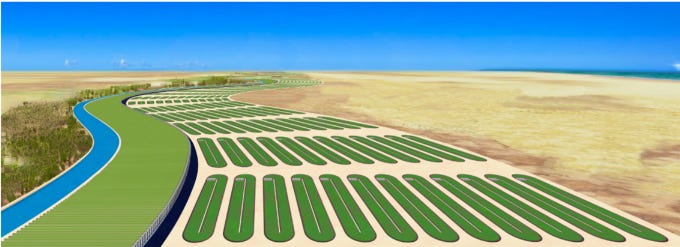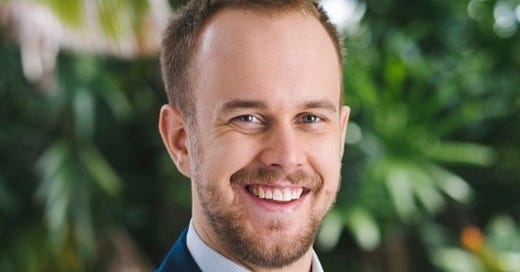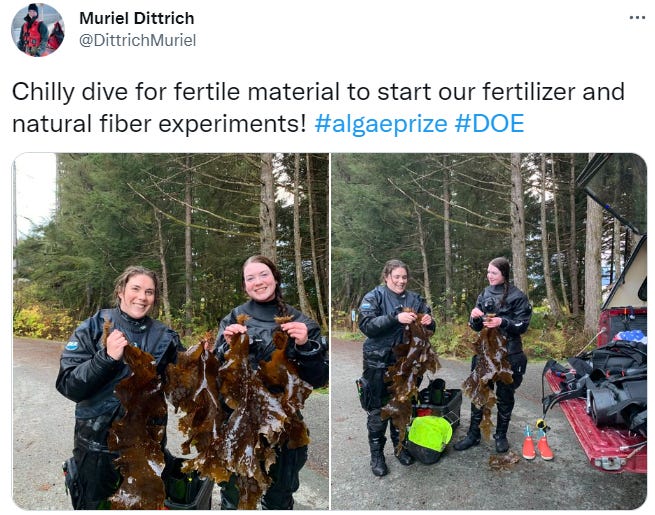🌍Seaweed, blockchain and digitalisation with Sea Green
PLUS: How to sustainably produce microalgae, and London-based Lightrock secures $834 million for climate tech fund.
"Just start by doing what you can, and believe that you can make a difference." — Fred Puckle Hobbs, CEO of Sea Green
Dear algae technologists - hello and welcome to the Paxtier Report!
Before we dive into the newsletter this week, I need your help.
I would love to hear your thoughts or feedback on how I can improve Paxtier for you!
Could you please take a moment to share some candid feedback with me here?
Don't hold back! It’s anonymous and I read every response. I want to know what you really think. Thank you!

In today’s report:
Markets: 💸 SWEN Capital Partners just raised $120 million for its Blue Ocean fund.
Deals: 🤝 FlexSea will receive £50k from Btomorrow Ventures.
Movers and Shakers: 🌍Seaweed, blockchain and digitalisation with Sea Green.
Around the web: 💡 Yang et al.'s new global dataset could hold the answers to tackling nitrate pollution.
Markets and Investing
✂️Algae Market Snippets
Some big moves in recent weeks:
US seaweed pioneer BLU3 has partnered with Te Huata to develop commercial seaweed research, nursery and farming facilities in the South Pacific. (Read more HERE).
SWEN Capital Partners just raised $120 million for its Blue Ocean fund. With this capital, the team hopes to finance startups across sustainable aquaculture, ocean data, plant and cell-based seafood, alternatives to single-use plastic, renewable marine energies and decarbonization of maritime transport. (Read more HERE).
In Israel, an algae-based protein company and a vegan foods manufacturer are collaborating to develop protein-enriched plant-based cheese. (Read more HERE).
Purissima has become the first biotech company to reach commercial scale production of natural cannabinoids using microalgae fermentation. 👏🌿 (Read more HERE).
Australia will join Joe Biden’s global pledge to cut methane emissions by 30% by 2030. More than $3bn will support agricultural methane reduction and other clean tech initiatives... And $8m has been allocated to the seaweed industry to support the commercialisation of the asparagopsis feed supplement. (Read more HERE).
In case you missed it - Propeller has raised an inaugural $100M VC fund for ocean-focused climate tech... 🎉 (Read more HERE).
NOAA: National Oceanic & Atmospheric Administration is announcing $18.9 million in funding for harmful algal bloom (HAB) research projects and monitoring activities throughout U.S. coastal and Great Lakes waters. (Read more HERE).
London-based Lightrock secures $834 million for climate tech fund. The firm plans to invest in areas such as clean energy, decarbonisation and sustainable agriculture. "Lightrock will write checks as small as $10 million, and up to around $39 million, for sustainability focused startups in Europe and North America, the firm said in a statement on the fund. (Read more HERE).
Seaweed farm to be established in Devon after securing funding from Green Innovation Fund. "The funding is helping Algapelago Marine Ltd to bring forward its scheme to create a seaweed farm and processing operation in Bideford Bay, with plans to scale up the farm each year following this pilot."(Read more HERE).
Yeast vs algae in the hunt for astaxanthin - Willow Biosciences Inc has started yeast strain optimisation and process development towards the commercial production of astaxanthin. (Read more HERE).
The first community owned processing facility for seaweed in Scotland is coming. (Read more HERE).
Origin by Ocean starts a collaboration with MeEat Food Tech Oy.(Read more HERE).
Polar Algae will start building a brand new processing facility for Polar Algae in Hammerfest. (Read more HERE).
Kelpinor won a total of NOK 1,000,000 from #ArcticIgnite - a competition sponsored by The Norwegian Ministry of Foreign Affairs and launched by Norinnova AS. (Read more HERE).
FlexSea won BAT's #BattleoftheMinds, beating over 4,500 entrants, and will receive £50k from Btomorrow Ventures. (Read more HERE).
Solabia-Algatech caters to post-COVID trends with Astaxanthin gummies. (Read more HERE)
Bharathidasan University (BDU) has signed a Memorandum of Understanding (MoU) With Kwalitee Algae Farms, Karur, for remediation of textile dye effluents using extremophilic microalgae. (Read more HERE).
Cultivated seafood teams are overcoming high costs. Novel single-stem cell technologies, lipid-loading techniques, and well-designed downstream processes are behind recent price breakthroughs. And these upgrades could slash processing costs by an amazing 75% - making cultivated seafood affordable for mainstream consumers. (Read more HERE).
UK-based startup Really Clever is developing fully biodegradable vegan leather made entirely from mushrooms and algae. (Read more HERE).
An invention aimed at improving the efficiency of processes in the algal biofuels industry has won Otago Innovation’s $100,000 Proof of Concept Competition for 2022. (Read more HERE).
GreenWaveNZ has undertaken New Zealand’s first large scale outplanting of hatchery grown native Ecklonia radiata seaweed, with 228 metres of tiny seedlings planted in the waters off the Coromandel coastline as part of a regenerative ocean farming pilot. The $5 million pilot is led by natural resource sector project developer EnviroStrat, in collaboration with Ngāti Pūkenga, Ngāi Tai ki Tāmaki, seaweed product developer Premium Seas, the Universities of Waikato and Auckland and seaweed processor AgriSea. (Read more HERE).
Ecuadorian shrimp producer Empagran wins aquaculture feed challenge with Veramis algae oil feed. (Read more HERE).
Pond Technologies has received a $350,000 milestone payment under its contract with a major undisclosed Oil and Gas company signed in August 2021. The company met the milestone after it extracted recombinant proteins from algae...(Read more HERE).
CH4 Global received a grant of NZ $850,000 from the New Zealand Ministry for Primary Industries’ Sustainable Food and Fibre Futures fund (SFF Futures). (Read more HERE). The company also signed a Memorandum of Understanding (MoU) with Siemens to support CH4 Global's expansion plans and hopes to add four new 'aquaculture and production facilities' in the next 12 months through its subsidiary CH4 Australia... (Read more HERE).
German biomaterials company one • five is collaborating with Australia’s Flinders University to create a biopolymer made from seaweed. (Read more HERE).
In depth with Peter Green
🌍Seaweed, blockchain and digitalisation with Sea Green
Fred Puckle Hobbs is the CEO of Sea Green, a Singapore based aqua-fintech start-up using blockchain and data to enhance connectivity in seaweed aquaculture.
Thanks to the company's innovative technology platform, Sea Green hopes to support macroalgae farmers on several key operational fronts, including environmental monitoring and online payments.
And in this snippet from our recent call, Fred and I discuss the product, the evolution of the organisation, and advice for others in the space.
How has Sea Green evolved to where it is now?
When our team first came together, we wanted to improve the distribution of climate change protection products for smallholder coastal fishing communities in North Java.
We knew these products could alleviate a major source of stress for low-income households. So, we began to develop a cooperative framework solution which could make them more accessible.
Unfortunately, it became increasingly difficult to navigate the fishing environment in this part of the world due to illegal, unreported and unregulated fishing (IUU). And this ultimately led to our pivot into macroalgae aquaculture instead - eventually developing a new cooperative framework across governance, structuring and technology to support seaweed farming families.
As part of that work, we discovered the need for digitalisation in this sector. And after exploring the problems, opportunities, strengths, and weaknesses in the industry, created Sea Green - a digital platform which helps users access more customers, trade online, and monitor environmental data using blockchain technology.
What stage is your technology at?
Now that we’ve gathered extensive feedback on our prototypes and have MARI Oceans as a major customer base, we’ve set an MVP launch date for 2023.
To meet that objective, we’re working very closely with a set of solution architects, developers and experts who will ensure the delivery of the blockchain technology.
And after developing our MVP, we’d like to take additional investment and spread the platform across the whole of Indonesia. In this way, we can iteratively improve the value chain with the data we collect, and implement our technology across different locations and forms of aquaculture.
What advice would you give to others in this space?
When I first moved into this area from investment banking, I suffered a bit from imposter syndrome. But after a while, I realised that additionality was more important than my background.
Essentially, it became clear that the industry can still benefit from my knowledge, despite me not being an expert in macroalgae cultivation.
So, that would be my advice for anyone in this space - just start by doing what you can, and believe that you can make a difference.
If you’d like to learn more about Sea Green or join them in their mission as an investment partner, check out the company's site. You can also follow Fred on LinkedIn here.
🐦Tweet of the week
📝Research Rundown: How to sustainably produce microalgae
THE BIG IDEA
Recently, I interviewed Corinna Bellizzi from Örlö Nutrition (a new brand by VAXA Technologies), who is leading the development of the world’s first carbon-negative omega-3 product.
In that chat, I discovered VAXA’s approach to sustainably cultivating microalgae.
And now, thanks to a new paper by Tzachor et al., it’s possible to gain even deeper insight into the breakthrough methodology:
The breakdown
In this study, Spirulina algae (Spirulina platensis) is cultivated in geothermally powered photobioreactors which draw on resources from Hellisheiði (Hellisheidi) power station.
Thanks to some nifty standard life cycle assessments, the team calculate the environmental impact of their large-scale Spirulina production facility.
And the results are inspiring.
The results
Compared to conventionally produced meat from beef cattle, the study shows that Spirulina algae cultured in the geothermal park requires less than 1% land & water, and emits less than 1% GHGs.
This means that for every 1 kg of beef meat replaced with 1 kg of GeoSpirulina, the average consumer can save ~ 100 kg CO₂ -eq GHGs. And the biomass contains all essential amino acids.
When reading, be sure to check out…
The modular property of the Spirulina facility, which allows for rapid production scale-up and offers the possibility to deploy similar facilities in other locations.
The team reiterates that this facility could increase food and protein self-sufficiency, reduce environmental impacts associated with shipping, and enhance the resilience of domestic food networks - creating a resource efficient, zero-carbon, and nutritious protein alternative.
🔥 What else was hot in algae tech?
Researchers are exploring whether algae could serve as a sustainable source of sugar. By using a specific strain of algae that develops a symbiotic relationship with the microbe Paramecium bursaria, they hope to sustainably capture carbon and create sugar as a byproduct. (Read more HERE).
(Paper) Yang et al.'s new global dataset could hold the answers to tackling nitrate pollution. (Read more HERE).
New UWA program connects emerging PhD talent with global start-ups. (Read more HERE).
Deep Science Ventures is launching a doctorate which puts venture creation at the heart of the PhD.(Read more HERE).
The central biocatalyst in photosynthesis, Rubisco, is the most abundant enzyme on earth. And by reconstructing these billion-year-old enzymes, a team of Max Planck researchers has deciphered one of the key adaptations of early photosynthesis.. (Read more HERE).
Ocean Visions has just released a new report intended to guide research on the efficacy and impacts of cultivating macroalgae (seaweed) for the purpose of sequestering carbon. (Read more HERE).
China Develops ‘Seawater Battery’ To Generate Clean Electricity (HERE).
(Paper) Marine diatoms show high plasticity in adapting to fluctuating light conditions. (Read more HERE).
Turning a new page in the history of photo-bioreactor algae culture. (Read more HERE).
Algae could be instrumental in making human exploration of Mars possible. (Read more HERE).
That’s all folks!
Thanks again for joining us this week. Hope you have a great day and stay tuned for more algae tech updates soon!
Peter






